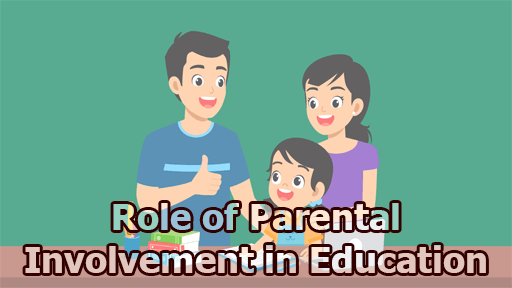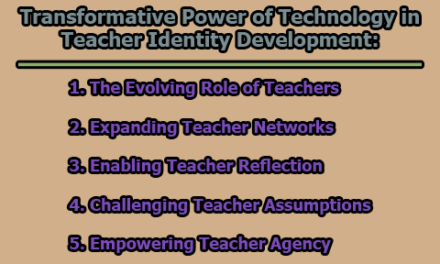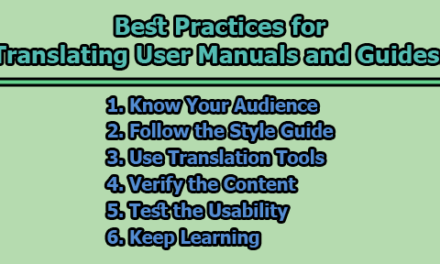Role of Parental Involvement in Education:
Education is often regarded as the cornerstone of a prosperous and well-functioning society. It is the vehicle through which knowledge is imparted, skills are developed, and future leaders are nurtured. While schools, teachers, and curricula play pivotal roles in shaping a child’s educational journey, the importance of parental involvement in education cannot be overstated. Parental involvement is a multi-faceted concept encompassing a wide range of activities and behaviors that parents engage in to support their children’s educational development. In this article, we will explore the multifaceted role of parental involvement in education, its impact on student outcomes, and strategies for enhancing it.
Section 1: Defining Parental Involvement in Education:
Parental involvement in education refers to the participation of parents or guardians in their child’s educational journey. It encompasses a spectrum of activities, from simple actions like helping with homework to more complex roles like participating in school governance. Parental involvement can be categorized into several forms:
1.1 Academic Support: This form of parental involvement encompasses a wide range of activities aimed at enhancing a child’s academic progress. It includes:
- Homework Assistance: Parents can play an active role in helping their children with homework assignments. This assistance may involve explaining concepts, reviewing completed assignments, or providing guidance when challenges arise.
- Educational Activities at Home: Parents can create a home environment conducive to learning. This may involve setting aside a quiet study space, providing access to educational resources, and encouraging regular reading and learning activities.
- Resource Provision: Parents can ensure that their children have access to necessary learning resources, such as books, educational websites, and educational games or apps. They may also invest in supplementary educational materials that align with their child’s interests and needs.
1.2 Communication: Effective communication between parents and educators is essential for a child’s educational success. This aspect of parental involvement includes:
- Parent-Teacher Conferences: Parents should actively participate in scheduled conferences with teachers. These meetings provide an opportunity to discuss a child’s progress, strengths, and areas that may need improvement. They are also an opportunity to collaboratively set goals for the child’s development.
- Response to School Communications: Parents should promptly respond to school communications, such as newsletters, emails, or notices. Staying informed about school activities, important dates, and policies is crucial for active involvement.
- Regular Check-Ins: Ongoing communication between parents and teachers can take various forms, such as regular emails, phone calls, or digital platforms designed for parent-teacher communication. These interactions allow for updates on a child’s academic performance and any emerging concerns.
1.3 School Engagement: Active participation in school-related events and activities strengthens the connection between parents and the school community. This type of parental involvement includes:
- Volunteering: Parents can volunteer their time and skills to support school events or classroom activities. Volunteering may involve assisting with field trips, helping organize school functions, or participating in extracurricular programs.
- Joining PTAs or School Boards: Parent-Teacher Associations (PTAs) and school boards provide parents with opportunities to contribute to school decision-making and policy discussions. These roles allow parents to advocate for the best interests of students and the school community.
- Attendance at School Events: Parents can attend school-related events such as parent-teacher meetings, open houses, and school performances. These events offer a chance to connect with educators, other parents, and the broader school community.
1.4 Advocacy: Parental advocacy involves actively working to ensure that their child receives the support and resources needed for academic success. Key aspects of advocacy include:
- Meeting with School Administrators: Parents may schedule meetings with school administrators to discuss their child’s individual needs, concerns, or any challenges they may be facing in the school environment. These meetings aim to find solutions and support mechanisms.
- Resource Allocation: Parents can advocate for equitable resource allocation within the school to ensure that their child and others receive access to essential learning materials, support services, and extracurricular opportunities.
- Support for Special Needs: If a child has special educational needs, parents can work with educators and specialists to develop and implement an Individualized Education Plan (IEP) or a 504 Plan to provide tailored support.
1.5 Emotional Support: Beyond academics, parents also play a vital role in their child’s emotional well-being and overall development:
- Encouragement and Motivation: Parents can offer words of encouragement and motivation to boost their child’s self-esteem and confidence. These positive affirmations can significantly impact a child’s attitude toward learning and personal growth.
- Emotional Guidance: Parents should create a safe and open environment where children feel comfortable discussing any emotional or social challenges they may face. Offering guidance and support during difficult times helps children navigate their feelings effectively.
- Balancing Academic and Personal Life: Parents should emphasize the importance of a balanced life, where academic success is not the sole focus. Encouraging participation in extracurricular activities, hobbies, and maintaining a healthy lifestyle is crucial for a child’s well-rounded development.
Section 2: The Impact of Parental Involvement:
Numerous studies have shown that parental involvement in education has a profound impact on student outcomes. Here are some key areas where parental involvement makes a difference:
2.1 Academic Achievement: Parental involvement plays a pivotal role in enhancing a child’s academic achievement through various means:
- Homework Assistance: When parents actively engage in helping their children with homework, students benefit from improved comprehension and completion of assignments. Parental support can clarify concepts, reinforce learning, and reduce frustration.
- Access to Learning Resources: Involved parents ensure that their children have access to a wide range of learning resources, including books, educational websites, and educational materials. This access extends a child’s knowledge and reinforces classroom learning.
- Supportive Learning Environment: An environment at home that encourages learning and values education fosters academic growth. Parents who actively engage in discussions about school, set high expectations, and create a structured and supportive atmosphere enhance their child’s academic performance.
2.2 Positive Attitude Towards School: Parental involvement also significantly impacts a child’s attitude towards school, influencing several key aspects:
- Motivation: Children with involved parents tend to be more motivated to learn. They see education as valuable, and parental encouragement reinforces their enthusiasm for academic pursuits, driving higher levels of engagement in classroom activities.
- Higher Self-Esteem: Parental support and recognition of a child’s efforts contribute to higher self-esteem. Children feel valued and confident in their abilities, which positively influences their willingness to participate actively in school and extracurricular activities.
- Reduced Behavioral Problems: Students with engaged parents are less likely to exhibit behavioral problems at school. The consistent presence of supportive parents contributes to a sense of security and emotional stability, reducing the likelihood of disruptive behavior.
2.3 Improved Behavior: Parental involvement is associated with improved behavior in students, both in and out of the classroom:
- Following Rules: Children with involved parents tend to understand and follow classroom rules more effectively. They are familiar with expectations for behavior and the consequences of not adhering to these rules.
- Respect for Teachers and Peers: Active parental involvement emphasizes the importance of respecting teachers and peers. Children learn the value of cooperation and empathy, leading to more harmonious interactions within the school environment.
- Better Self-Discipline: Parental guidance encourages the development of self-discipline in students. They internalize the importance of responsibility and self-control, which positively impacts their behavior in and out of school.
2.4 Higher Graduation Rates: Research suggests that students with involved parents are more likely to graduate from high school and pursue higher education:
- Clear Understanding of Education’s Importance: Parental involvement reinforces the significance of education in a child’s life. Students with actively engaged parents are more likely to understand the long-term benefits of completing their education, motivating them to graduate from high school.
- Guidance in Post-Secondary Choices: Involved parents often play a pivotal role in helping their children navigate the process of selecting and applying to colleges or vocational programs. They provide guidance, support, and access to resources necessary for pursuing higher education or career opportunities.
2.5 Better Social Skills: Parental involvement in education not only impacts academic aspects but also contributes to the development of essential social skills:
- Effective Communication: Children with engaged parents often have better communication skills. They learn the value of expressing themselves clearly and listening actively to others, which fosters improved social interactions.
- Interpersonal Skills: Parental support and involvement encourage children to develop positive interpersonal skills. They learn how to build and maintain relationships, resolve conflicts, and collaborate effectively with peers and authority figures.
- Empathy and Respect: Active parental involvement reinforces values such as empathy and respect for others. Children are more likely to understand different perspectives and exhibit considerate behavior in social situations.
Section 3: Barriers to Parental Involvement:
While the benefits of parental involvement in education are well-documented, it’s essential to acknowledge the barriers that some parents face when trying to be actively engaged in their child’s education. These barriers can include:
3.1 Time Constraints: One of the most prevalent challenges parents face is the limitation of time. Many parents have demanding work schedules, which can make it difficult to find the time for school-related activities. Juggling long working hours, multiple jobs, or irregular shifts can leave parents with limited availability to attend parent-teacher meetings, participate in school events, or assist with homework.
3.2 Language and Cultural Barriers: Language and cultural differences can pose significant obstacles to parental involvement. Parents who speak a different language or come from diverse cultural backgrounds may encounter difficulties when trying to communicate effectively with school staff. This language barrier can hinder their ability to grasp school policies, interact with teachers, and advocate for their child’s needs.
3.3 Lack of Education: Some parents may have limited formal education, which can lead to feelings of inadequacy when it comes to supporting their children academically. A lack of education can affect their confidence in helping with homework or engaging in educational discussions. This can result in a reluctance to actively participate in their child’s educational journey, particularly in subjects where they may lack expertise.
3.4 Financial Constraints: Financial limitations can be a substantial barrier to parental involvement. For some families, the costs associated with school supplies, field trips, or extracurricular activities can be prohibitive. Parents may find it challenging to provide the necessary financial contributions for these activities, which can lead to feelings of exclusion from certain aspects of their child’s education.
3.5 School-Parent Communication: Effective communication between schools and parents is vital for fostering parental involvement. However, in some cases, schools may fall short in maintaining clear and regular communication with parents. This may include infrequent or unclear updates about school activities, important dates, or a lack of accessible communication channels. When parents feel uninformed or disconnected, their motivation to participate in their child’s education may diminish.
3.6 Parental Stress and Well-being: Personal stressors and challenges in parents’ lives can significantly impact their ability to prioritize their child’s education. Factors such as financial stress, health issues, or family crises may take precedence over school-related activities. Parental well-being, including mental health, plays a crucial role in determining their capacity to actively engage in their child’s education. When parents are dealing with their own stressors, their ability to support their children academically may be compromised.
Section 4: Strategies for Enhancing Parental Involvement:
To overcome these barriers and promote parental involvement in education, various strategies can be implemented:
4.1 Open and Welcoming Schools: To foster parental involvement, schools should prioritize creating an environment that is open and welcoming. This can be achieved through:
- Translation Services: Offering translation services to address language barriers, ensuring effective communication between parents and school staff.
- Flexible Meeting Times: Providing flexibility in scheduling meetings, including options outside regular working hours, to accommodate diverse parental schedules.
- Culturally Sensitive Programs: Implementing programs that respect and celebrate the cultural diversity of parents and students, creating an inclusive atmosphere.
4.2 Parent Education Programs: Empowering parents with the knowledge and skills to support their children’s learning is crucial. This can be achieved through:
- Workshops: Hosting workshops on topics such as study habits, homework assistance, and strategies for encouraging a love of reading.
- Resource Libraries: Establishing resource libraries or online platforms where parents can access educational materials and recommended resources.
4.3 Regular Communication: Effective communication between schools and parents is essential. Schools should ensure:
- Newsletters: Regularly publishing newsletters with updates on school activities, important dates, and academic achievements, along with tips for parents.
- Emails and Phone Calls: Using digital communication channels like emails and phone calls to maintain regular contact with parents, allowing for quick updates and opportunities for questions and clarification.
4.4 Volunteer Opportunities: Encouraging parents to actively participate in school events or volunteer in classrooms can strengthen their connection to the school community. Strategies include:
- Parent Volunteers: Inviting parents to volunteer for various school activities, from field trips to classroom assistance.
- Parent-Teacher Associations (PTAs): Encouraging parents to join PTAs or other parent organizations that play a vital role in shaping school policies and advocating for students.
4.5 Homework Support: Schools can provide resources and guidance to parents to help them support their children with homework:
- Homework Guidelines: Sharing clear guidelines on the purpose of homework, recommended time allocations, and strategies for creating a conducive homework environment.
- Online Resources: Offering online resources or apps that parents can use to access additional educational materials, tutorials, or homework assistance.
4.6 Parent-Teacher Conferences: Regular parent-teacher conferences are essential for in-depth discussions about a child’s progress. Schools should ensure:
- Scheduled Meetings: Setting up scheduled parent-teacher conferences that allow ample time for discussions about a child’s strengths, areas for improvement, and goals.
- Two-Way Communication: Fostering two-way communication during these meetings, encouraging parents to share their insights and concerns while educators provide valuable feedback.
4.7 Peer Support: Establishing parent support groups or networks can provide a sense of community and allow parents to share their experiences and strategies for involvement:
- Peer-to-Peer Sharing: Encouraging parents to connect with one another to exchange ideas, tips, and experiences related to supporting their child’s education.
- Supportive Community: Creating a supportive community where parents can seek advice, guidance, and emotional support from others facing similar challenges and successes.
In conclusion, parental involvement in education is not merely a supportive component of a child’s learning journey; it stands as a pivotal cornerstone of academic success and holistic development. The impact of engaged parents on a child’s educational experience cannot be overstated, as their involvement transcends the classroom walls, shaping a student’s attitudes, behaviors, and overall achievements. In this era of education, where collaboration between parents and educators is increasingly recognized as essential, exploring the profound influence of parental involvement becomes paramount. This article delves into the multifaceted dimensions of parental involvement, its far-reaching consequences, the barriers that some parents encounter, and the effective strategies that can bridge the gap between home and school, ultimately nurturing well-rounded, successful learners.
Frequently Asked Questions [FAQs]:
What is parental involvement in education?
Parental involvement in education refers to the active participation of parents or guardians in their child’s educational journey. It encompasses a wide range of activities, from assisting with homework to engaging in school-related events and advocating for a child’s educational needs.
Why is parental involvement important in education?
Parental involvement has a profound impact on student outcomes. It contributes to improved academic achievement, a positive attitude toward school, better behavior, higher graduation rates, and enhanced social skills. Engaged parents play a crucial role in shaping a child’s educational success.
What are the different forms of parental involvement?
Parental involvement can be categorized into various forms, including academic support (helping with homework), communication (engaging with teachers), school engagement (participating in events), advocacy (ensuring resources), and emotional support (encouragement and well-being).
What are some barriers to parental involvement in education?
Common barriers include time constraints due to work, language and cultural differences, limited parental education, financial constraints, ineffective school-parent communication, and parental stress or well-being issues.
How can schools enhance parental involvement?
Schools can promote parental involvement through open and welcoming environments, parent education programs, regular communication, volunteer opportunities, homework support, parent-teacher conferences, and peer support networks. These strategies can help bridge the gap between home and school.
What are the benefits of parental involvement for students?
Active parental involvement leads to improved academic performance, a positive attitude toward school, better behavior, higher graduation rates, and enhanced social skills. It contributes to a well-rounded and successful educational experience.
How can parents get involved in their child’s education?
Parents can get involved by attending parent-teacher conferences, volunteering at school events, helping with homework, staying informed about their child’s progress, and participating in parent-teacher associations (PTAs) or support groups. Additionally, they can seek out resources and workshops offered by the school to enhance their involvement.
What should parents do if they face barriers to involvement?
If parents encounter barriers, they can communicate with the school to seek solutions, such as flexible meeting times or language support. They can also connect with other parents to share experiences and strategies for overcoming challenges. Seeking out parent education programs can help build skills and confidence.
How can communities support parental involvement in education?
Communities can play a role by offering resources, such as libraries and community centers, where parents and children can engage in educational activities. They can also support school initiatives that promote parental involvement and facilitate partnerships between schools and community organizations.
What is the overall impact of parental involvement on education?
Parental involvement has a far-reaching impact on a child’s academic success, behavior, attitude toward school, and social development. It underscores the vital role that parents play in shaping the educational journey and future success of their children.
References:
- Barnard, W. M. (2004). Parent involvement in elementary school and educational attainment. Children and Youth Services Review, 26(1), 39-62.
- Clark, L. S. (2019). Parental involvement and student academic performance: A multiple mediational analysis. The Journal of Educational Research, 112(2), 173-186.
- Compton-Lilly, C. (2003). Reading families: The literate lives of urban children. Teachers College Press.
- Cooper, H., Lindsay, J. J., Nye, B., & Greathouse, S. (2001). Relationships among attitudes about homework, amount of homework assigned and completed, and student achievement. Journal of Educational Psychology, 93(1), 55-64.
- Crosnoe, R. (2001). Academic orientation and parental involvement in education during high school. Sociology of Education, 74(3), 210-230.
- Dauber, S. L., & Epstein, J. L. (1993). Parents’ attitudes and practices of involvement in inner-city elementary and middle schools. In N. F. Chavkin (Ed.), Families and schools in a pluralistic society (pp. 97-124). State University of New York Press.
- Desimone, L. M. (1999). Linking parent involvement with student achievement: Do race and income matter? Journal of Educational Research, 93(1), 11-30.
- Dunst, C. J., Bruder, M. B., Trivette, C. M., Raab, M., & McLean, M. (2013). Characteristics and consequences of everyday natural learning opportunities. Topics in Early Childhood Special Education, 32(3), 160-172.
- Epstein, J. L. (2010). School, family, and community partnerships: Preparing educators and improving schools. Westview Press.
- Epstein, J. L., & Dauber, S. L. (1991). School programs and teacher practices of parent involvement in inner-city elementary and middle schools. The Elementary School Journal, 91(3), 289-305.
- Fan, X., & Chen, M. (2001). Parental involvement and students’ academic achievement: A meta-analysis. Educational Psychology Review, 13(1), 1-22.
- Harvard Family Research Project. (2013). Family involvement in elementary school children’s education. Harvard Graduate School of Education.
- Henderson, A. T., & Mapp, K. L. (2002). A new wave of evidence: The impact of school, family, and community connections on student achievement. National Center for Family & Community Connections with Schools.
- Hill, N. E., & Craft, S. A. (2003). Parent-school involvement and school performance: Mediated pathways among socioeconomically comparable African American and Euro-American families. Journal of Educational Psychology, 95(1), 74-83.
- Hill, N. E., & Tyson, D. F. (2009). Parental involvement in middle school: A meta-analytic assessment of the strategies that promote achievement. Developmental Psychology, 45(3), 740-763.
- Hoover-Dempsey, K. V., & Sandler, H. M. (1997). Why do parents become involved in their children’s education? Review of Educational Research, 67(1), 3-42.
- Lareau, A. (2011). Unequal childhoods: Class, race, and family life (2nd ed.). University of California Press.
- Moll, L. C., Amanti, C., Neff, D., & Gonzalez, N. (1992). Funds of knowledge for teaching: Using a qualitative approach to connect homes and classrooms. Theory into Practice, 31(2), 132-141.
- Patrikakou, E. N. (2008). Parental involvement: The missing link in school achievement. Preventing School Failure: Alternative Education for Children and Youth, 52(4), 119-122.
- Pomerantz, E. M., & Moorman, E. A. (2010). Parents’ involvement in children’s schooling. American Psychological Association.
- Redding, S., Murphy, M., & Sheley, P. (2009). The effects of school, family, and community collaboration on student achievement and school improvement (3rd ed.). Southwest Educational Development Laboratory.
- Sanders, M. G. (2008). The role of parent involvement in early childhood education: A historical overview. The Elementary School Journal, 108(5), 1-15.
- Turney, K., & Kao, G. (2009). Barriers to school involvement: Are immigrant parents disadvantaged? The Journal of Educational Research, 102(4), 257-271.

Former Student at Rajshahi University










